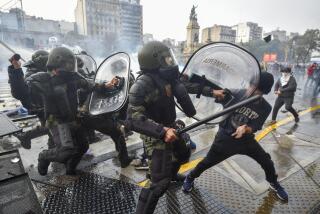Game of ‘Chicken’ Has Russian Parliament Nervous : Standoff: Police movements near the legislative building evoke cries for weapons among lawmakers’ supporters.
- Share via
MOSCOW — Outside the Parliament building, the presidential grip is tightening. Inside, they may be on the verge of eating their young.
On Day 4 of the showdown between Russian President Boris N. Yeltsin and the defiant Parliament that, though decreed dissolved, refuses to quit, Yeltsin’s forces encircled the Parliament building with riot police.
Riot police get paid extra to be scary, and in Russia they are good at their job. The helmeted “special forces” carrying truncheons marched down the hill Friday from the American Embassy, while others in bulletproof vests cordoned off an area around the Parliament building, or White House, to prevent sympathizers from joining the crowd of about 4,000 camped out at the barricades.
At 10 p.m., the White House electricity was cut off.
“They are going to storm us! Get out! Get out quick!” a police captain yelled, though Yeltsin administration officials had promised that no violence would be used to evict the lawmakers.
Flashlights could be seen in some windows as Alexander V. Rutskoi, whom Parliament has given presidential powers, came out on the darkened balcony to speak to the faithful. Three stocky guards held a bulletproof shield in front of Rutskoi’s chest as they did for Yeltsin in August, 1991, when he stepped out on the same balcony to ask the crowd to crush a coup by Soviet hard-liners.
“Give us weapons! Give us submachine guns!” some shouted.
“We can win only one way--not with submachine guns, truncheons or fists,” Rutskoi said. “We can win only with law.”
By early today, most of the troops were gone. Presumably they will return later for a new round of the Russian political game better known in America as “chicken.”
Inside the White House, things were not going well. Telephone lines stayed severed, and tempers began to flare.
In Soviet days, a People’s Deputy commanded respect. Better still, he commanded perks. Lawmakers got free tickets to and from their districts; no need to mingle with their surly constituents standing in line at Aeroflot. Deputies had special diplomatic passports for overseas travel, and, when in Moscow, they had access to government cars and discount theater tickets.
Yeltsin had eliminated these perks Tuesday with the stroke of a pen. This is getting to be a habit of the president, who has not proven forgiving of those who cross him.
He has, for example, unplugged Constitutional Court Chairman Valery D. Zorkin’s car phone, forbidden Parliament Chairman Ruslan I. Khasbulatov to fly on military airplanes and kicked Rutskoi out of his offices in the Kremlin.
Yeltsin apparently hoped that yanking the free tickets would keep the unruly deputies at home. Legislative leaders said Thursday that transportation problems were hindering efforts to gather a quorum.
Deputies from remote regions faced one-way air fares of up to $140. That’s about three months’ salary for the average Russian, a huge expense “if you are a normal family and not a mafioso,” as one deputy put it.
Legislative leaders said they suspected that difficulty in procuring tickets was being used as an excuse not to come to Moscow by deputies already wavering about the wisdom of defying a president. And by Thursday, Yeltsin appeared to have the upper hand in a land where liquidating the losers is traditional.
“Some deputies remember well the fate of the 17th Communist Party Congress,” whose members voted against Stalin’s reelection as party general secretary in 1936 and did not live to regret it, said Vladislav P. Balovnev, deputy governor of Kemerovo, a city in south-central Russia.
Thanks to secret balloting, Stalin never knew who had voted against him. As a result, Balovnev said, “Almost all of the delegates were arrested and shot shortly after the Congress.”
Two years after the collapse of the Soviet Union, lawmakers still remember.
“They are just afraid,” he said. “It is understandable.”
Whether they stayed home out of sympathy for or fear of the president, or simply for financial reasons, the two-thirds of the 1,031 deputies needed for a quorum never showed. On Thursday, Parliament passed a law expelling about 90 deputies who worked for the executive branch, thus guaranteeing a quorum. The slimmed-down Congress of People’s Deputies then convened and approved the impeachment of Yeltsin.
On Friday, in a surreal show of bravado, the Congress reconvened and ordered the government it considers illegal to lower prices for milk, other foodstuffs and medicines for women and children, the elderly and invalids.
This accomplished, right-wingers made an attempt to dump their leader, Khasbulatov. This failed after Rutskoi compared the session to “a kindergarten” and warned lawmakers disunity could be fatal.
Meanwhile, the language of the power struggle becomes ever more absurd.
“The former president should resign,” Khasbulatov said.
“Abolished Congress of People’s Deputies Opens in Moscow,” announced a headline.
Even Justice Zorkin is floundering. Asked how he could argue that the president had already been legally impeached yet still call for compromise between the president and Parliament, he replied, “You have caught me in a contradiction. But note that the contradiction is born of a contradictory situation whose participants are located in a real so-called parallel world.”
Yeltsin has been trying his best to show Russians that he, at least, is not in a parallel world. In an apparent attempt to prove that he is carrying on normally, Yeltsin sent warm congratulations Friday to a world festival of reindeer-breeders meeting in Norway.
Sergei Loiko in The Times’ Moscow bureau contributed to this report.
More to Read
Sign up for Essential California
The most important California stories and recommendations in your inbox every morning.
You may occasionally receive promotional content from the Los Angeles Times.













